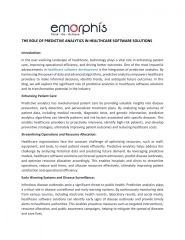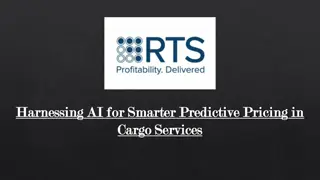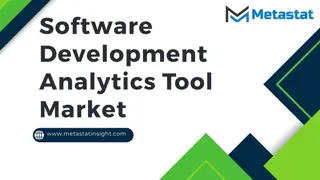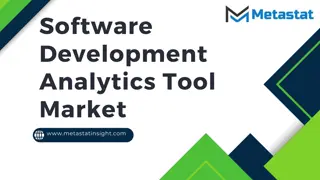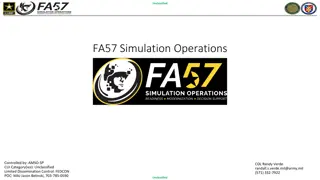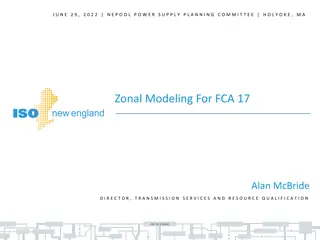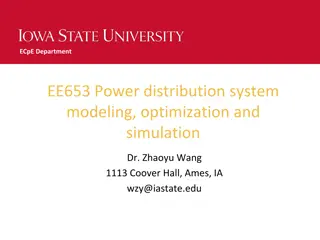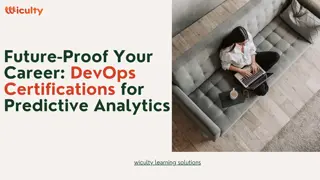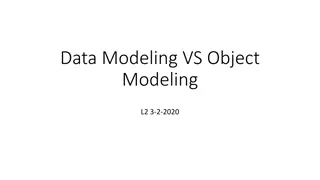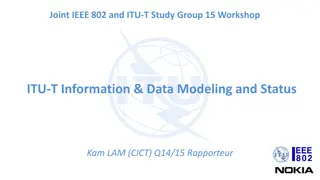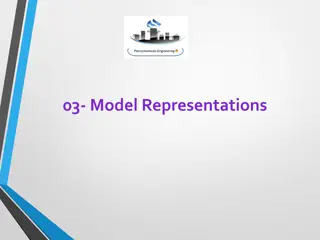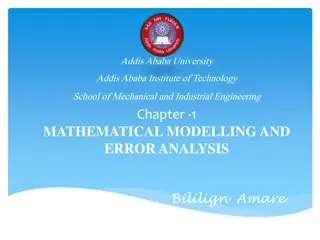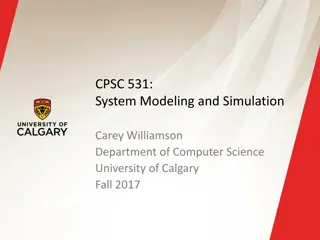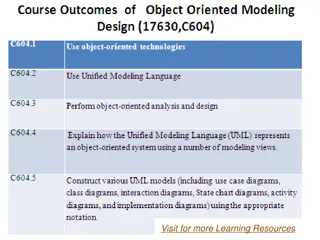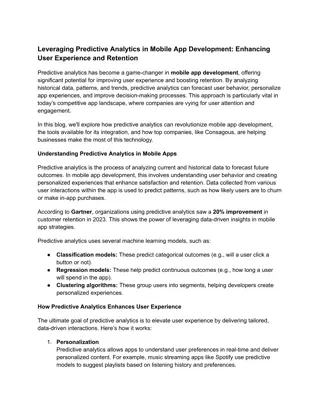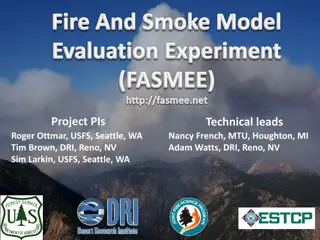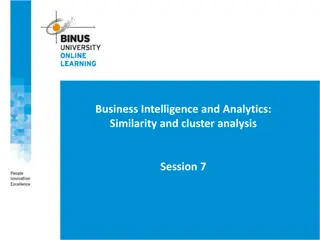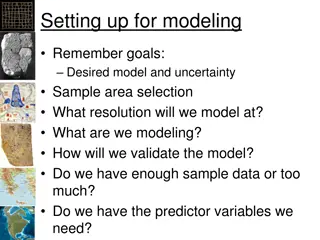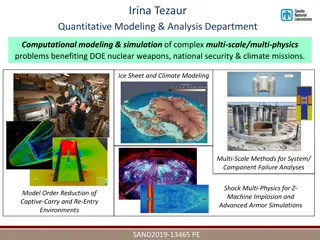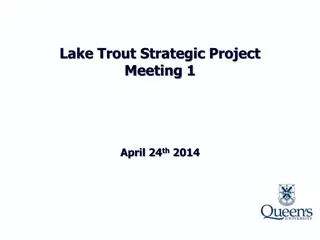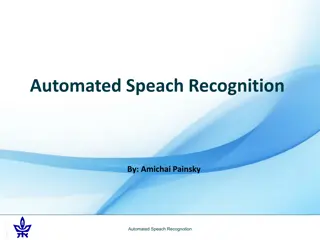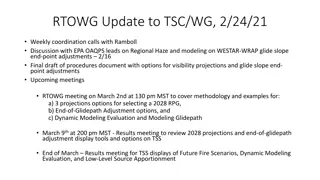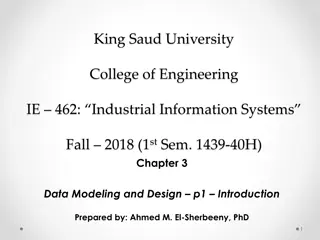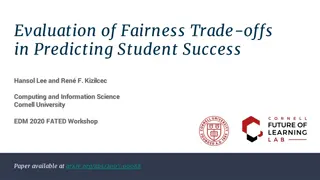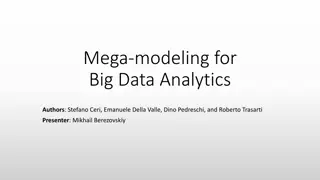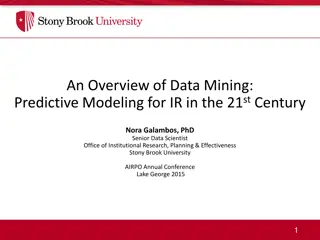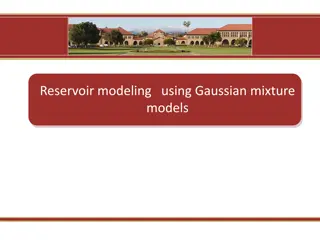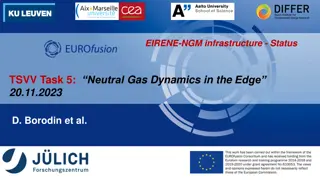THE ROLE OF PREDICTIVE ANALYTICS IN HEALTHCARE SOFTWARE SOLU
In the ever-evolving landscape of healthcare, technology plays a vital role in enhancing patient care, improving operational efficiency, and driving better outcomes. One of the most impactful advancements in healthcare software development is the integration of predictive analytics.
3 views • 3 slides
Predictive DFT Mixing: Successes and Opportunities in Materials Science
Laurie Marks from Northwestern University discusses the successes and opportunities in predictive DFT mixing, focusing on the advancements in density functional theory, fixed-point solvers, and the approach taken in physics and pragmatism. The presentation includes insights on the applications of DF
2 views • 52 slides
Harnessing AI for Smarter Predictive Pricing in Cargo Services
In today's fast-paced global market, the efficiency and agility of cargo services are paramount. One of the significant challenges faced by the logistics sector involves the dynamic nature of pricing strategies which directly influence profitability and customer satisfaction. Here, Artificial Intell
10 views • 5 slides
Revolutionizing Field Force Management with Advanced Applications
Revolutionizing field force management, advanced applications leverage AI, IoT, and predictive analytics to optimize resource allocation, enhance decision-making, and boost productivity. Predictive analytics forecasts demand, streamlines maintenance, and optimizes routes, ensuring efficiency and cus
14 views • 6 slides
Software Development Analytics Tool Market Share, Forecasts 2023-2030
The Software Development Analytics Tool market's significance extends beyond mere project monitoring; it delves into the realm of predictive analytics. By leveraging historical data and performance metrics, these tools enable organizations to anticipate potential bottlenecks, identify areas for impr
0 views • 8 slides
Software Development Analytics Tool Market Share, Forecasts 2023-2030
\nThe Software Development Analytics Tool market's significance extends beyond mere project monitoring; it delves into the realm of predictive analytics. By leveraging historical data and performance metrics, these tools enable organizations to anticipate potential bottlenecks, identify areas for im
0 views • 8 slides
Overview of Army Modeling and Simulation Office
The U.S. Army Modeling and Simulation Office (AMSO) serves as the lead activity in developing strategy and policy for the Army Modeling and Simulation Enterprise. It focuses on effective governance, resource management, coordination across various community areas, and training the Army Analysis, Mod
2 views • 8 slides
Capacity Zone Modeling for Forward Capacity Auction 17 Results
This presentation unveils the Capacity Zone modeling calculations for Forward Capacity Auction 17 associated with the 2026-2027 Capacity Commitment Period by ISO-NE PUBLIC. It delves into boundary definitions, import-constrained zone modeling, and market rules guiding the assessments and modeling pr
1 views • 16 slides
Distribution Feeder Modeling and Analysis Overview
This document delves into the modeling, optimization, and simulation of power distribution systems, specifically focusing on Distribution Feeder Modeling and Analysis. It covers the components of a typical distribution feeder, series components, Wye-Connected Voltage Regulator modeling, and equation
1 views • 14 slides
Future-Proof Your Career DevOps Certifications for Predictive Analytics
As businesses continue to embrace digital transformation, the demand for professionals who can integrate DevOps with predictive analytics will only grow. By obtaining relevant certifications, you can position yourself at the forefront of this excitin
0 views • 8 slides
Understanding Data Modeling vs Object Modeling
Data modeling involves exploring data-oriented structures, identifying entity types, and assigning attributes similar to class modeling in object-oriented development. Object models should not be solely based on existing data schemas due to impedance mismatches between object and relational paradigm
0 views • 17 slides
Evolution of Modeling Methodologies in Telecommunication Standards
Workshop on joint efforts between IEEE 802 and ITU-T Study Group 15 focused on information modeling, data modeling, and system control in the realm of transport systems and equipment. The mandate covers technology architecture, function management, and modeling methodologies like UML to YANG generat
1 views • 16 slides
Understanding Geometric Modeling in CAD
Geometric modeling in computer-aided design (CAD) is crucially done in three key ways: wireframe modeling, surface modeling, and solid modeling. Wireframe modeling represents objects by their edges, whereas surface modeling uses surfaces, vertices, and edges to construct components like a box. Each
1 views • 37 slides
Reading Activities and Predictive Learning Session Details
Engage in reading activities and predictive learning exercises. Access resources and participate in daily readings. Develop skills such as prediction, inference, vocabulary understanding, and summarizing. Explore thrilling reads and enhance your reading comprehension. Join the session on May 6th, 20
0 views • 7 slides
Mathematical Modeling and Error Analysis in Engineering
Mathematical modeling plays a crucial role in solving engineering problems efficiently. Numerical methods are powerful tools essential for problem-solving and learning. This chapter explores the importance of studying numerical methods, the concept of mathematical modeling, and the evaluation proces
0 views • 10 slides
BricknBolt: AI-Powered Predictive Maintenance for Construction Equipment
The most significant thing in the modern construction industry is how efficient and reliable the equipment is. It is very costly to experience downtime since it results in increased costs and delays. Predictive maintenance, aided by Artificial Intell
1 views • 5 slides
Introduction to Dynamic Structural Equation Modeling for Intensive Longitudinal Data
Dynamic Structural Equation Modeling (DSEM) is a powerful analytical tool used to analyze intensive longitudinal data, combining multilevel modeling, time series modeling, structural equation modeling, and time-varying effects modeling. By modeling correlations and changes over time at both individu
1 views • 22 slides
System Modeling and Simulation Overview
This content provides insights into CPSC 531: System Modeling and Simulation course, covering topics such as performance evaluation, simulation modeling, and terminology in system modeling. It emphasizes the importance of developing simulation programs, advantages of simulation, and key concepts lik
1 views • 28 slides
Understanding Object Modeling in Software Development
Object modeling is a crucial concept in software development, capturing the static structure of a system by depicting objects, their relationships, attributes, and operations. This modeling method aids in demonstrating systems to stakeholders and promotes a deeper understanding of real-world entitie
1 views • 65 slides
Coupled Ocean-Atmosphere Modeling on Icosahedral Grids
Coupled ocean-atmosphere modeling on horizontally icosahedral and vertically hybrid-isentropic/isopycnic grids is a cutting-edge approach to modeling climate variability. The design goals aim to achieve a global domain with no grid mismatch at the ocean-atmosphere interface, with key indicators such
2 views • 21 slides
Leveraging Predictive Analytics in Mobile App Development_ Enhancing User Experience and Retention
Discover how predictive analytics is transforming the mobile app development landscape in our latest blog, How Predictive Analytics is Shaping the Future of Mobile App Development. By leveraging data and machine learning models, predictive analytics
1 views • 4 slides
Fire and Smoke Modeling Evaluation Effort (FASMEE) Overview
FASMEE is a collaborative project aimed at assessing and advancing fire and smoke modeling systems through critical measurement techniques and observational data. Led by key technical leads, FASMEE focuses on diverse modeling areas such as fire growth, effects, coupled fire-atmosphere behavior, smok
5 views • 30 slides
Subarea and Highway Corridor Studies: Travel Demand Modeling and Refinements
In this lesson, we delve into subarea and corridor studies focusing on travel demand model refinements, highway network coding, corridor congestion relief, and trip assignment theory. Subarea modeling plays a crucial role in forecasting travel within smaller regions with detailed traffic patterns, t
1 views • 45 slides
Understanding Similarity and Cluster Analysis in Business Intelligence and Analytics
Explore the concept of similarity and distance in data analysis, major clustering techniques, and algorithms. Learn how similarity is essential in decision-making methods and predictive modeling, such as using nearest neighbors for classification and regression. Discover (dis)similarity functions, n
0 views • 35 slides
Essential Steps for Setting up a Modeling Study
Ensure clarity on modeling goals and uncertainties. Select sample areas strategically based on interest and available data. Determine appropriate resolution for modeling. Define variables to model and validate the model effectively. Assess sample data adequacy and predictor variables availability. E
0 views • 9 slides
Water Storage Tanks Hydraulic Modeling and Water Quality Considerations
This presentation by Justine Carroll, P.E., Project Manager, focuses on the hydraulic modeling and water quality considerations related to water storage tanks. It covers topics such as water age evaluation, steady state modeling, extended period simulations, pump controls, demand patterns, EPS verif
0 views • 34 slides
Advancing Computational Modeling for National Security and Climate Missions
Irina Tezaur leads the Quantitative Modeling & Analysis Department, focusing on computational modeling and simulation of complex multi-scale, multi-physics problems. Her work benefits DOE nuclear weapons, national security, and climate missions. By employing innovative techniques like model order re
0 views • 6 slides
Flexible Framework for Stormwater Lids Modeling
A new flexible framework for forward and inverse modeling of stormwater lids is presented. It includes governing equations, hydraulic and contaminant transport, numerical methods, and demonstration cases for various green infrastructure components. The importance of different processes in modeling i
0 views • 20 slides
Lake Trout Strategic Project Meeting Summary
Lake Trout Strategic Project Meeting held on April 24th, 2014, focused on developing new predictive tools to forecast the impact of climate change on hypolimnetic dissolved oxygen concentrations in Lake Trout lakes of Ontario. The meeting agenda covered project objectives, timeline, communication st
0 views • 18 slides
Sustainability and Organic Livestock Modeling for Global Food Security
The research presented at the 18th Organic World Congress in Istanbul delves into the Sustainability and Organic Livestock (SOL-m) modeling approach developed by FAO and FiBL. The study aims to explore the potential impacts of global conversion to organic livestock production by 2050 on food securit
1 views • 25 slides
Understanding Automated Speech Recognition Technologies
Explore the world of Automated Speech Recognition (ASR), including setup, basics, observations, preprocessing, language modeling, acoustic modeling, and Hidden Markov Models. Learn about the process of converting speech signals into transcriptions, the importance of language modeling in ASR accuracy
0 views • 28 slides
Update on Modeling and Coordination Discussions
Weekly coordination calls with Ramboll and discussions with EPA OAQPS leads focused on Regional Haze and modeling adjustments. Final draft of procedures document with visibility projections and glide slope adjustments. Upcoming RTOWG meetings covering methodology, projections, and modeling evaluatio
0 views • 5 slides
Importance of Data Modeling in Industrial Information Systems
Introduction to data modeling and design in Industrial Information Systems at King Saud University College of Engineering. The chapter covers the significance of data modeling, capturing data characteristics, structural information, and the role of databases and DBMS. Data modeling fills crucial gap
0 views • 51 slides
Evaluation of Fairness Trade-offs in Predicting Student Success
This study delves into fairness concerns in predicting student success, examining trade-offs between different measures of fairness in course success prediction models. It explores statistical fairness measures like demographic parity, equality of opportunity, and positive predictive parity. Through
0 views • 11 slides
Mega-Modeling for Big Data Analytics
Mega-Modeling is a comprehensive approach that encompasses model construction, evaluation, composition, evolution, and search to address challenges in various areas such as social and economic resilience, health, transportation, and energy management. The pillars of Mega-Modeling include Model-Drive
0 views • 14 slides
Analysis and Predictive Modeling of Ancient Greek Temples Throughout the Mediterranean
This study by Sean Patrick Yusko delves into the analysis and predictive modeling of ancient Greek temples in the Mediterranean region. It focuses on spatial relationships, patterns, and potential predictive modeling based on data collected from 236 temples spanning from 800 BC to 150 AD. The resear
0 views • 13 slides
NetLogo - Programmable Modeling Environment for Simulating Natural and Social Phenomena
NetLogo is a powerful and versatile programmable modeling environment created by Uri Wilensky in 1999. It allows users to simulate natural and social phenomena by giving instructions to multiple agents operating independently, making it ideal for modeling complex systems evolving over time. NetLogo
0 views • 7 slides
Data Mining: Overview and Best Practices for Predictive Modeling
Data mining involves utilizing various methods to analyze and extract valuable insights from a vast amount of data. This process includes data wrangling to prepare the data for analysis, examining missing data, studying distributions, and identifying outliers. Training, validation, and test partitio
0 views • 29 slides
Reservoir Modeling Using Gaussian Mixture Models
In the field of reservoir modeling, Gaussian mixture models offer a powerful approach to estimating rock properties such as porosity, sand/clay content, and saturations using seismic data. This analytical solution of the Bayesian linear inverse problem provides insights into modeling reservoir prope
0 views • 10 slides
Development of EIRENE-NGM for Neutral Gas Dynamics in Fusion Reactors
EIRENE-NGM project focuses on enhancing the neutral gas dynamics model for fusion reactor simulations, including efficient HPC utilization, physics basis refinement, database improvement, interface development, and predictive capability validation. Collaborators from various institutes aim to create
0 views • 17 slides
